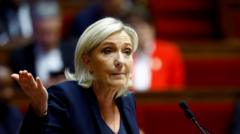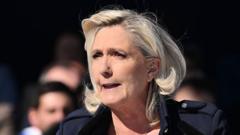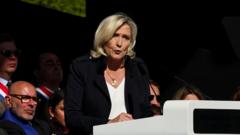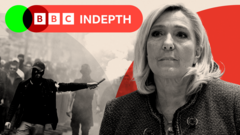The outcome of the trial could reshape the National Rally party's political strategies ahead of the next presidential election.
**Le Pen's Legal Setback Sends Shockwaves Through French Politics**

**Le Pen's Legal Setback Sends Shockwaves Through French Politics**
Marine Le Pen's conviction raises questions about the future of the French far-right.
Marine Le Pen's departure from a Paris courtroom this morning was emblematic of the political turmoil shaking the French far right. Exiting in disbelief, Le Pen was informed that she faces a five-year ban from holding public office due to embezzlement of European Union funds. This sentence effectively derails her ambitions for the 2027 presidential election, and the ramifications are being felt widely within her party, the National Rally (RN).
Initially, many—including Le Pen’s political adversaries—anticipated that a figure of her stature would not face such stringent legal repercussions. There was a prevailing sentiment among various political factions that the judge would be reluctant to impose a sanction that could eliminate a major contender from the political fray. The opposing voices ranged across the spectrum—from the far-left leader Jean-Luc Mélenchon to centrist Prime Minister François Bayrou and Justice Minister Gérald Darmanin from the right—who all argued that Le Pen's removal would undermine democratic values.
But the judge, Bénédicte de Perthuis, chose to uphold the stricter legal framework recently established, which imposes severe penalties for public fund misappropriation. This decision may have taken even Le Pen’s own party by surprise, exposing the RN to a politically precarious situation.
As party leaders gather for urgent discussions in the wake of the verdict, they now face points of contention. Should they hold onto the hope that Le Pen's pending appeal could restore her eligibility? Though there is a theoretical chance her ban could be lifted through expedited judicial processes, many view this as optimistic at best. Alternatively, party strategists might consider endorsing 29-year-old Jordan Bardella as a potential candidate, albeit with the understanding that his popularity does not quite match Le Pen's long-standing rapport with supporters.
In terms of electoral implications, the immediate fallout could paradoxically galvanize RN’s voter base. Many supporters are likely to interpret Le Pen’s conviction as a victimization by the political establishment, reinforcing their narrative that the populist right is unfairly targeted by a corrupt system. Despite the scandal, voters may overlook the illicit uses of party funds familiar to many French political entities.
However, the underlying dynamics suggest that Le Pen’s absence could diminish the appeal of the RN. While Bardella holds promise, his youth and relative inexperience may not readily fill the emotional and experiential gap left by Le Pen, whose enduring presence has been a cornerstone for her supporters.
Moreover, with Le Pen still serving as a member of the National Assembly—leading the largest parliamentary block—questions arise about her future role in leveraging this power. Some within the RN may argue for a more aggressive approach to dismantle the existing government led by Prime Minister Bayrou, potentially seeking retribution for what they perceive as an orchestrated attack on their leadership.
The outcomes of this legal battle remain uncertain, but the implications for the French right are profound, underscoring both the vulnerabilities and the resilience of the RN amidst a shifting political landscape.




















